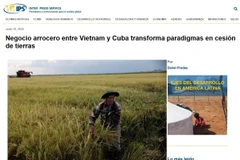HCM City (VNA) – Despite mounting challenges from tariffs and logistics, Vietnamese exporters to the US can still 'turn the tide' by understanding market demands and adopting effective cost-optimisation solutions, experts say.
These insights were shared at a panel discussion on logistics solutions for import-export enterprises facing US tariff challenges, held on June 18 by the Ho Chi Minh City Investment and Trade Promotion Centre (ITPC). The event aimed to update businesses on new regulations and compliance requirements regarding US tax, trade, and customs policies, while offering practical solutions to facilitate exports amid shifting trade dynamics.
According to ITPC Deputy Director Ho Thi Quyen, Vietnam’s economy is showing signs of recovery, with exports posting encouraging growth. Data from the National Statistics Office under the Ministry of Finance showed that in the first five months of this year, Vietnam’s total export value reached 180.23 billion USD, up 14% year-on-year. The US remained Vietnam’s largest trading partner, with bilateral trade reaching 57.2 billion USD during the period. Notably, Vietnam recorded a trade surplus of 49.9 billion USD with the US, an increase of 28.5% over the same period last year.
Logistics is a key driver of Vietnam’s economic development, providing vital services in freight transport and supply chain management. The year 2025 marks a pivotal transition for the country’s logistics sector as it seizes opportunities from global supply chain shifts while contending with growing pressure from US reciprocal tariff policies.
Nunzio De Filippis, CEO of Cargotrans USA, noted that US trade policy is undergoing a strategic shift, pushing international importers to diversify supply chains and explore alternative sourcing options. He underscored the rising importance of bonded warehouses and Free Trade Zones (FTZs) in deferring or mitigating tariff risks on inventory.
The shift in US trade policy is creating major opportunities for countries like Vietnam,” he said, elaborating that the US is actively seeking stable suppliers in Southeast Asia, and Vietnamese firms are well-positioned to replace Chinese suppliers in many sectors.
Nguyen Tran Khanh Hoang, CEO of the Super Cargo Service Group, highlighted three major challenges Vietnamese enterprises must address to seize these opportunities: high logistics costs, risks in document preparation, and vulnerability to trade fraud investigations, alongside the need to meet strict US logistics standards.
On the financial front, experts recommended adopting the “First Sale for Export” (FSFE) programme, which legally allows US importers to declare customs value based on the first transaction price (between the manufacturer and the intermediary), rather than the second transaction (between the intermediary and the importer).
A case study involving Vietnamese apparel exports demonstrated that applying FSFE could reduce the dutiable value of a shipment from 100,000 USD to 85,000 USD, lowering total tariff payments from 26,500 USD to 22,525 USD, resulting in savings of nearly 4,000 USD per shipment. For exporters shipping 100 containers per year, this could translate to annual savings of up to 400,000 USD.
Additional services such as Incoterm auditing, which helps exclude domestic export-side costs from dutiable value, and duty drawback can further enhance exporters’ financial efficiency. These tools strengthen businesses’ resilience and help them capture growth opportunities amid ongoing global supply chain volatility./.




























